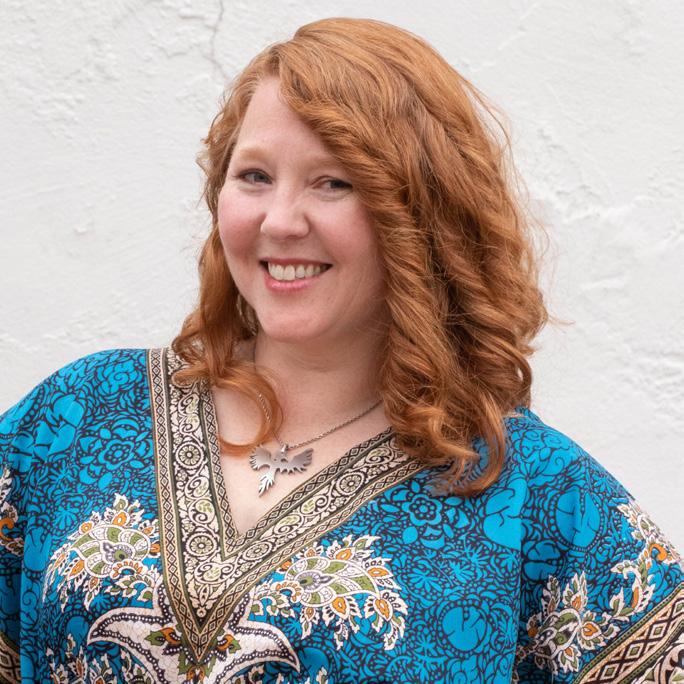
9 minute read
BUILDING A NEW SEXUAL BLUEPRINT
By Rachel Grant
As we begin to explore this topic, I want to acknowledge first that sex is multifaceted and layered.
It has everything to do with the actual mechanics of sex, like how your vagina, penis, clit works, what feels good, what turns you on; fantasies, kinks, the emotional connection, navigating things like dissociation and triggering during sex, all of the layers of feelings—so uh, there’s no way we can cover it all in one article.
Therefore, what we are going to do today is focus on one major theme.
RECLAIMING.
And for some of you it might actually feel better to think of it as Claiming – depending on how you land on certain things.
But the bottom line is to reclaim or claim first our bodies. We have to actually be in these bodies in order to have healthy, wonderful, fulfilling, live sex. And there is reclaiming your actual sexuality. Like I own that, and what I desire and what I want are in the realm of mine. It’s not as constructed by society or media or religion or your parents or the abuse. But it is constructed through choice and ownership.
The first place we always start is messaging —belief systems.
What does it mean for our introduction to our sexual self to be a violation? What message does that send to our body, our spirit, our core sense of who we are? How can we feel good or safe in a body that we may associate with shame, pain, objectification, violence?
So through the various experiences you’ve had, what has developed is a blueprint for your sexuality and your relationship to your body. We are going to work with this by thinking about the messages you received or experiences you had that then translate to lessons learned (your current sexual blueprint).
Identify One Message/False/Limiting Belief: (e.g. my partner’s pleasure comes before mine)
Where did I learn that? (e.g. abuse, movies, being taught to put others first)
Therefore I…(e.g. would always focus on my partner’s pleasure and back-burner my own).
New blueprint to challenge the old message: (e.g. I deserve to experience and prioritize my own pleasure).
Even if we were never physically touched, our understanding of and relationship to sex (our blueprint) was changed as a result of the abuse.
Below is a list of common responses to sex or sexual behaviors (adapted from Shelter from the Storm) that show up for people who have been abused.
Unable to enjoy kissing
Guilty or dirty feelings after sex or about sex
Difficulty setting boundaries in sex
Feeling guilty about the things you find pleasurable
Inability to tolerate own body
Dissociation from own body during sex
Feeling of worthlessness if unable to provide sex
Inability to look at a naked man or woman
Phobic avoidance of genitals
Effort to make life better with sex
Avoidance of sexual activity
Compulsive sexual behavior
Sexual acting out
Lack of sexual desire
Feeling of being caught during sex
Fear of letting go during sex or stopping yourself from feeling pleasure
Crying during or after sex
Feeling of being good only for sex
Lack of sensitivity in a part of your body
Difficulty with or inability to achieve orgasm
Inability to have drug- or alcohol-free sex
Desire to make partner responsible for sex
Preoccupation with other concerns during sex
Eagerness for sex to be over
Feeling of having to perform during sex
Inability to ask for sexual needs to be met
Anger during or after sex
Aversion to touching oneself
Inability to be playful during sex
Very strict rules for how sex should be
Some of these responses and behaviors may require the help of a trained professional to overcome (e.g., dissociation). Yet the majority are the outcome of one very powerful false belief, “If sex did not exist, I wouldn’t be in this mess in the first place !” In short, sex is bad. The critical error here is that we are blaming sex instead of the abuser for what happened.
As a result, we continue to connect what we experienced at the hands of our abuser with the experiences we are now having as adults. The touch of a lover is experienced as if it is the touch of the abuser. Words of seduction seem to be spoken in the same voice as the abuser.
However, there is a huge difference between our abuser and our lover, and a huge difference between the sex that occurred with the abuser and the sex that is occurring with our lover. The first step to take toward reclaiming our sex life is to distinguish or separate the sex that occurred during the abuse from the sex of our adult life. Let’s explore this a bit more:
When you were abused, you were experiencing sex out of____________________.
Example: Fear, obligation, forced submission
One very major thing was missing: consent.
Our abuser never gave us a choice; sex occurred out of obligation and service to the abuser’s desires. However, it is an error to continue thinking of sex as something we have to do or should do, that it is all about the other person, that we have no choice about it. We are adults now and we have the right to choose!

Right now, we might be choosing to avoid sex, hate sex, or fake enjoyment of sex. Yet we have the opportunity and the right to make different choices. Our lovers are not our abuser(s). We do not have to have sex with them out of obligation or for the sole purpose of meeting their needs.
If there is a part of our body that we do not like to have touched, we can ask our lover not to touch us there. Or we can choose to separate the touch that is occurring now from the touch that occurred then and give up the error of thinking that it is all the same!
Furthermore, we need to give up the lie that our sexual preferences are a result of abuse and therefore dysfunctional. If you like kinky sex, then this is what you prefer. If you like quiet, slow sex, then this is what you prefer. If you are a straight man who enjoys fantasizing about men, then this is what you prefer.
It is your choice. Period.
A client whose abuser had performed oral sex on her was struggling to engage in this act with her boyfriend. We spent quite some time doing the work to separate the experience she had with the abuser from her current, present-day relationship. When she was ready, she agreed to spend as much time as she needed looking at her boyfriend to ground herself in the present and saying her declaration—“It is my choice ”—before asking him to go down on her. She decided to make a clear request as to which areas were “off limits” and that she only wanted it to last five minutes. A few months later, she happily reported, “I can’t believe it! I chose to ask him go down on me for a half hour, and I felt so present and relaxed.”
If you don’t receive anything else offered here today – please be sure to hear this, because if we continue to have sex out of obligation – we are re-traumatizing ourselves. And if we are going into a place of trauma, then we have to disconnect from our body because the only way to show up for something that feels traumatizing is to not be fully in the body. And so we get more and more separated from our self, our pleasure (which is what we like), our desire (which is what we want).
So a critical first step in reclaiming our body and sexuality is to make a strong commitment to not having sex out of obligation.
Now, how about reclaiming our sexuality —what do we want to do with these fabulous bodies?! And what do we want to experience? And to get to that, we first need to update our definitions, beliefs, our rules of engagement about sex and to start choosing what we want…building a new sexual blueprint.
I want ...
Relationships to be…
Intimacy to be…
Desire (what I want) to be…
Pleasure (what I like) to be…
Sex to be…
What you’ve just done is begin to name what it is you really want this area of your life to look like and feel like. And so, when you’re thinking about the choices you’re making—are they aligning with this? Are they generating this? Are you creating space for this? Are you getting that?
It’s also important to know that studies have shown that neglect, trauma, and abuse impacts two hormones in the brain that relate to sexuality: vasopressin and oxytocin.
Trauma causes an enhanced production of the stress hormone vasopressin, which leads to a decrease in feelings of safety and an increase in anxiety, defensiveness and fear—major buzz kills when it comes to sex.
To reduce vasopressin, we must reduce stress and activation.
Oxytocin plays a critical role in affiliative love and maintaining monogamous relationships. It is also triggers climax and release.
If we have a decrease in the production of oxytocin, then we will have a diminished capacity for sexual fulfillment.
To increase oxytocin, you can do things such as:
Laughter
Hugging
Pet an animal
Say the word “love”
Do something exhilarating (roller coaster)
Take a hot bath
Share a meal
Give a gift
Make eye contact
What’s one way you’ll give yourself some oxytocin boost today?
Your sex life will not change overnight. I get that these are tough issues after all, being naked and engaged with another person is just about as vulnerable and intimate as it gets. You can, though, begin reclaiming sex as fun, exciting, satisfying, ridiculous, breathtaking, playful, erotic, kinky, fulfilling (add your own adjectives) by owning the fact that you get to choose when, with whom, and how.
By the way, if you are single, you actually get to choose the type of sex you have with yourself as well!
It is about choice not obligation!
Even if you aren’t single!

ABOUT THE AUTHOR
Rachel is the owner and founder of Rachel Grant Coaching and is a Sexual Abuse Recovery Coach. Rachel holds a Master of Arts in Counseling Psychology and is the author of Beyond Surviving: The Final Stage in Recovery from Sexual Abuse and Overcome the Fear of Abandonment. You can download both free at rachelgrantcoaching.com.
She works with survivors of childhood sexual abuse to help them let go of the pain of abuse and finally feel normal.
Her program, Beyond Surviving , is specifically designed to change the way we think about and heal from abuse. She has successfully used this program to help her clients break free from the past and move on with their lives.
Reach Rachel atrachelgrantcoaching.com or on Facebook at www.facebook.com/groups/realtalkwithrachel.










